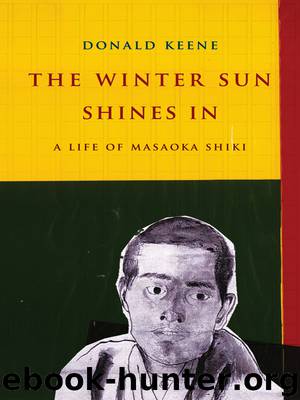The Winter Sun Shines In by Donald Keene

Author:Donald Keene
Format: epub
Tags: BIO007000, Biography % Autobiography/Literary, HIS021000, History/Asia/Japan
Publisher: Columbia University Press
Published: 2013-08-26T16:00:00+00:00
8
SHIKI AND THE TANKA
Shiki composed not only haiku but also many other varieties of Japanese poetry, even the sedōka that he unsuccessfully attempted to revive after a thousand years of oblivion.1 He maintained his interest in each of these genres of poetry, but he is known today primarily as a poet and critic of haiku. He is almost as well-known as a tanka poet, though he did not compose tanka seriously until years after he had acquired a reputation as a haiku poet.
In an early (1892) essay Shiki gave the reasons why Japanese had first been inspired to write “short poems,” the literal meaning of tanka.2 First and most important was the beauty of the landscapes of Japan, not only at the celebrated sites but almost everywhere else. Their beauty had aroused in the Japanese a natural impulse to capture them in words, in a manner “more lyrical than narrative; and, even more than lyrical, descriptive of nature.”
Shiki added, “To put it in another way, Japanese poets have rarely attempted to celebrate the peace and happiness of our people by considering human society in all its complications and proclivity for change.” This was true too of Shiki; his poems were primarily about nature, not people; he seldom wrote a poem that did not in some way touch on nature.3 However, his poems differed sharply with one important aspect of Japanese tradition: love had inspired Japanese poets of all periods, but Shiki composed no love poems.
Besides love, the anthologies of courtly poetry contained poems on travel, religion, and other topics, but there were great areas of human experience not depicted in traditional Japanese poetry except in the Man’yōshū, the richest but least typical anthology. Unlike Western or Chinese poets, Japanese poets normally did not describe warfare, loss of status, or other causes of suffering. Shiki attributed this absence to the harmony that had always prevailed between those who ruled and those who were ruled. He wrote, “In our country, ever since ancient times, the rulers have always behaved in a manner worthy of rulers and the subjects in a manner appropriate to subjects; that is why the relations between the two have been so close.”4
This opinion suggests that Shiki was influenced by the nationalist ideology of the newspaper Nippon, but in fact he extolled the harmonious relations between the rulers and the ruled in Japan not by way of explaining why Japanese poetry was superior to the poetry of other countries (as one would expect from a nationalist) but as the reason why the tanka had failed to develop into truly great poetry. Because the guidance of enlightened rulers was so benevolent, the lives of the Japanese people had been untroubled by disasters and there had not been “even one or two great painters or three or four great writers; instead, many minor painters and many minor writers were produced.”
Shiki seems to have believed, at least at this time, that the creation of great painting or great poetry required suffering of a kind that the Japanese, luckily for them, had never experienced.
Download
This site does not store any files on its server. We only index and link to content provided by other sites. Please contact the content providers to delete copyright contents if any and email us, we'll remove relevant links or contents immediately.
| African | Asian |
| Australian & Oceanian | Canadian |
| Caribbean & Latin American | European |
| Jewish | Middle Eastern |
| Russian | United States |
4 3 2 1: A Novel by Paul Auster(12393)
The handmaid's tale by Margaret Atwood(7767)
Giovanni's Room by James Baldwin(7347)
Asking the Right Questions: A Guide to Critical Thinking by M. Neil Browne & Stuart M. Keeley(5775)
Big Magic: Creative Living Beyond Fear by Elizabeth Gilbert(5774)
Ego Is the Enemy by Ryan Holiday(5450)
The Body: A Guide for Occupants by Bill Bryson(5098)
On Writing A Memoir of the Craft by Stephen King(4944)
Ken Follett - World without end by Ken Follett(4734)
Adulting by Kelly Williams Brown(4574)
Bluets by Maggie Nelson(4559)
Eat That Frog! by Brian Tracy(4541)
Guilty Pleasures by Laurell K Hamilton(4450)
The Poetry of Pablo Neruda by Pablo Neruda(4110)
Alive: The Story of the Andes Survivors by Piers Paul Read(4033)
White Noise - A Novel by Don DeLillo(4012)
Fingerprints of the Gods by Graham Hancock(4005)
The Book of Joy by Dalai Lama(3986)
The Bookshop by Penelope Fitzgerald(3854)
